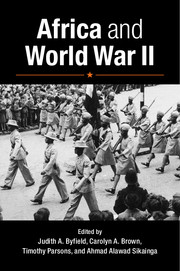Book contents
- Frontmatter
- Dedication
- Contents
- List of Contributors
- Acknowledgments
- Preface
- ONE INTRODUCTION
- TWO COLONIAL SUBJECTS AND IMPERIAL ARMIES
- THREE MOBILIZING COMMUNITIES AND RESOURCES FOR THE WAR EFFORT
- FOUR RACE, GENDER, AND SOCIAL CHANGE IN A TIME OF WAR
- FIVE EXPERIENCING WAR IN AFRICA AND EUROPE
- SIX WORLD WAR II AND ANTICOLONIALISM
- 23 Popular Resistance and Anticolonial Mobilization: The War Effort in French Guinea
- 24 Sudanese Popular Response to World War II
- 25 Ugandan Politics and World War II (1939–1949)
- SEVEN CONCLUSION
- Index
25 - Ugandan Politics and World War II (1939–1949)
from SIX - WORLD WAR II AND ANTICOLONIALISM
Published online by Cambridge University Press: 05 May 2015
- Frontmatter
- Dedication
- Contents
- List of Contributors
- Acknowledgments
- Preface
- ONE INTRODUCTION
- TWO COLONIAL SUBJECTS AND IMPERIAL ARMIES
- THREE MOBILIZING COMMUNITIES AND RESOURCES FOR THE WAR EFFORT
- FOUR RACE, GENDER, AND SOCIAL CHANGE IN A TIME OF WAR
- FIVE EXPERIENCING WAR IN AFRICA AND EUROPE
- SIX WORLD WAR II AND ANTICOLONIALISM
- 23 Popular Resistance and Anticolonial Mobilization: The War Effort in French Guinea
- 24 Sudanese Popular Response to World War II
- 25 Ugandan Politics and World War II (1939–1949)
- SEVEN CONCLUSION
- Index
Summary
World War II shaped Uganda's postwar politics through local understandings of a global war. Individually and collectively Ugandans saw the war as an opportunity rather than simply a crisis. During the war, they acquired wealth and demonstrated loyalty to a stressed British empire, inverting paternalistic imperial relations and investing loyalty and money in ways they expected would be reciprocated with political and economic rewards. For the 77,000 Ugandan enlisted soldiers and for the civilians who grew coffee and cotton, contributed money and organizational skills, and followed the war news, the war was not a desperate struggle for survival. Ideological aspects of the war, such as Fascism and Nazism, did not produce any widespread revulsion: Even at the height of the war, boys at the country's top school blithely organized a Nazi club. Instead, soldiers, fundraisers, and cotton growers sought personal opportunities as they demonstrated their loyalty and competence.
World War II, though, also taught the modern power of collective action and the potential exactions and interventions of an ambitious modern state, whether imperial or explicitly Fascist. Impoverished and indebted by the war, Britain was slow to accept Ugandan assessments of themselves as British allies, rather than subordinate clients. As the war ended, therefore, frustrated Ugandans, individually and collectively, broke with the low-key politics of petition that had characterized earlier years and moved toward a modern mass politics rooted in Ganda culture. This new politics defended Ganda initiative against British planning and demanded generational turnover and structural change from both older Ganda institutions and Uganda's colonial administration.
Background
When World War II broke out in 1939, Uganda was already approaching the end of a colonial era structured around the Uganda Agreement of 1900. The agreement's alliance between a Ganda oligarchy and British official and missionary leaders was losing its ability to define events in the central kingdom of Buganda, much less the protectorate as a whole.
- Type
- Chapter
- Information
- Africa and World War II , pp. 480 - 498Publisher: Cambridge University PressPrint publication year: 2015



